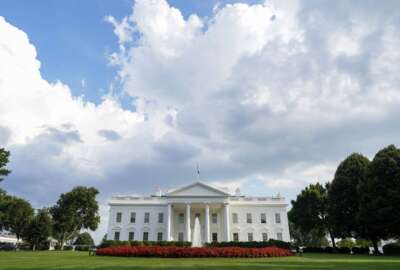To listen to the Federal Newscast on your phone or mobile device, subscribe in PodcastOne or Apple Podcasts. The best listening experience on desktop can be found using Chrome, Firefox or Safari.
- If you think the government embodies too many regulations, you’ve got a friend in a high place. Deputy Attorney General Jeff Rosen calls informal rulemaking by federal agencies the fuel of explosive growth of the administrative state. He spoke last week at a summit about modernizing the 1946 Administrative Procedures Act. Rosen said informal rule-making took off after environmental and health statutes of the 1960s and 1970s, and that today, regulation is the principal form of lawmaking. Rosen said between 1995 and 2017, agencies issued 92,000 rules. (Department of Justice)
- Paid family leave for federal employees appears to be one of the sticking points in final debates over the annual defense authorization bill. Virginia Sen. Mark Warner (D-Va.) says he’s hopeful Congress will include it in the 2020 bill. The House and Senate could vote on the annual Defense authorization act this week, the measure’s expected to include new family leave provisions for federal employees. Congressional staffers say conference committee negotiators agreed to a House-passed measure to extend 12 weeks of paid family leave in exchange for approval of President Trump’s proposed Space Force. The Democratic-led House has been pushing for the Federal Employee Paid Leave Act. It would give feds paid time off after the birth, adoption or foster placement of a new child — or for the care of a spouse, family member or themselves. (Federal News Network)
- Veterans Affairs will run out of funds for new benefits or the establishment of new facilities if 2020 appropriations are not passed by the end of the year. Dr. Richard Stone, executive in charge of the Veterans Health Administration, says that could impact the continued rollout of the MISSION Act. That law ties together separate VA networks. It also expands caregiver benefits to pre-1975 veterans. (Federal News Network)
- House lawmakers are worried a major financial management business transformation effort at VA is getting lost in the mix. The department says it’ll take 10 years and $2.5 billion dollars to implement a commercial product from CGI. The timeline has been pushed back as VA plans to implement an interoperable electronic health record and a new medical logistics system with the Defense Department. IT upgrades for the MISSION Act and Forever GI are also demanding VA IT time and resources. (Federal News Network)
- An appeals court has confirmed agencies don’t need to negotiate with federal unions before making changes to their employees’ performance evaluations. The National Treasury Employees Union had challenged Customs and Border Protection’s decision to overhaul its appraisal system. But the appeals court in D.C. affirmed CBP has the right to change it. NTEU argued it should have the right to bargain over those changes. But the U.S. Court of Appeals for the District of Columbia Circuit affirmed it was within CBP’s management rights to change its performance system. (Federal News Network)
- The National Institute of Standards and Technology is looking for feedback on what parts of its National Initiative for Cybersecurity Education framework need an update. The agency has asked its partners to comment on what components of the NICE framework have been the most helpful. NIST has also asked what’s missing from the framework, and how it could be more useful to a wider audience. NIST will accept comments through January 13. (National Institute of Standards and Technology)
- The best of the best federal cyber experts go head to head this week to win the President’s Cup. The final round of the President’s Cup Cybersecurity Challenge kicks off Tuesday and every team and individual comes from the Defense Department. These DoD cyber experts rose to the top out of more than 1,000 federal employees and more than 200 teams of feds who competed over the last three months in this first-ever online governmentwide competition. Starting Dec.10 at the Homeland Security Department offices in Arlington, Virginia, the best of the best will test their mettle to solve some of the most challenging cybersecurity puzzles, including a cyber escape room. (Federal News Network)
- Members of the Senate Intelligence Committee have warned the Federal Energy Regulatory Commission about the problems products from Chinese vendor Huawei could have on the country’s critical infrastructure. They want FERC’s cybersecurity division to work with the Homeland Security and the Energy Departments to minimize threats to the U.S. electric grid. The warning comes after the Trump administration has taken steps to eliminate Huawei products from national security and telecoms systems in the U.S. (Sen. James Risch)
- Work has begun on the Air Force’s Air Education and Training Command’s commercial wireless Wi-Fi across the command. AETC Learning Wi-Fi service was created to give airmen flexible environments. They’ll have access to electronic flight bags, mobile training devices, virtual reality and the Air Force Learning Services Ecosystem. It also lets airmen bring their personal devices into wireless training areas. (Air Force)
Copyright
© 2024 Federal News Network. All rights reserved. This website is not intended for users located within the European Economic Area.





